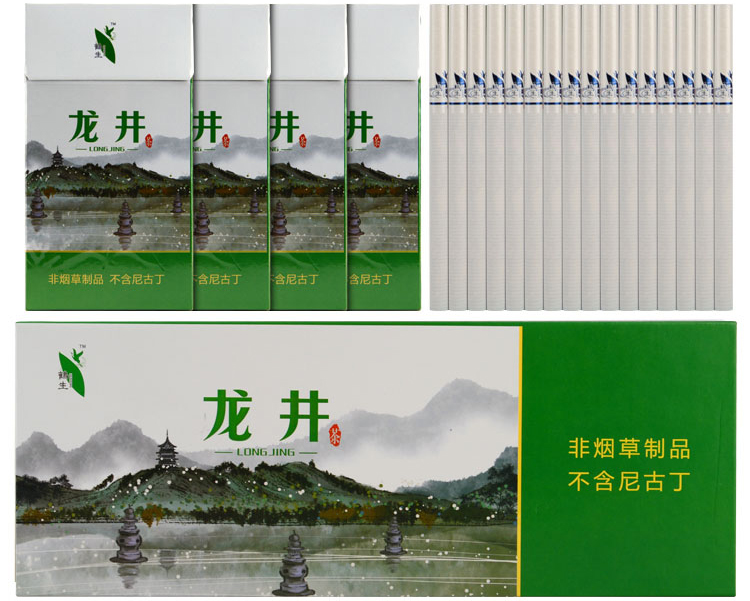Tea cigarettes replace e-cigarettes as the new favorite? Expert: smoking without fragrance is more u
From:
Tech Company Date:05-26 1357 Belong to:Industry Trends
E-cigarettes, which are "wearing" smoking cessation gimmicks, were once all the rage, and their online and offline sales were booming. However, in the second half of last year, e-cigarettes were suspended from online sales. At the same time, another new variety that is known to help quit smoking-tea tobacco, has quietly become popular.
New statistics show that in January 2020, the online sales of tea cigarettes reached 48.251 million yuan, an increase of 143% compared to February 2019, and the online transaction volume exceeded 500 million yuan in one year. Tea cigarettes seem to have the potential to replace online consumption of e-cigarettes.
In the form of cigarettes, there are no tobacco leaves

Open an e-commerce platform, search with "tea tobacco" as the key word, and the products are dazzling. The highest-selling tea cigarettes are more than 30,000 pieces per month, and the monthly sales of other brands are also thousands of pieces. There are also many types, which are often subdivided according to the types of tea involved in tea cigarettes, such as Pu'er, Golden Bud, Jasmine, Longjing, etc. Most tea tobacco products feature slogans such as "good for tobacco products", "good health gifts", and "non-tobacco products", which is exciting.
These slogans seem familiar, and when electronic cigarettes are all the rage, they are almost piled up with the above-mentioned rhetoric. However, tea cigarettes have a more attractive bargaining chip—no nicotine.
What is the difference between tea cigarettes and traditional cigarettes and electronic cigarettes?
The reporter learned that e-cigarettes are a product that users can smoke after turning nicotine into vapor through atomization and other means. Tea cigarettes use tea leaves instead of shredded tobacco in traditional cigarettes. The tea leaves are smoked after being lit, which has the shape of traditional cigarettes, but does not have the actuality of shredded tobacco. Smoking tea cigarettes is actually "sucking tea".
"Traditional cigarettes are addictive, mainly because of the nicotine in the smoke. But in addition to nicotine, the smoke of cigarettes also contains more than 60 harmful ingredients such as tar." A few days ago, Zhang Jianshu, president of the Beijing Tobacco Control Association, said Said in an interview with a reporter from Science and Technology Daily.
As for e-cigarettes, "classified according to the principle of smoking, e-cigarettes include heat-not-burn, e-liquid atomization and other types. Although to some extent harmful substances such as tar and suspended particles are reduced, most e-cigarettes are still addictive nicotine. As the main ingredient, compared with traditional cigarettes, it only changes the soup without changing the medicine." Zhang Jianshu said, on the other hand, smoking e-cigarettes may also inhale a variety of other undiscovered toxic compounds. At the same time, electronic cigarettes also have the health risks of second-hand smoke.
Zhang Jianshu pointed out that after the “lost” of electronic cigarettes, merchants have tried their best to make tea cigarettes as a good substitute for cigarettes. They used tea, a traditional beverage with a long history, as the focus of publicity, and used people's inherent impression of tea to be healthy to induce consumers. Pay for tea cigarettes. In addition, this year's sudden new crown pneumonia epidemic has changed the habits and perceptions of many smokers, which may be one of the reasons for the "rise" of tea cigarettes.
According to statistics from the Juanjuan Think Tank, popular science related to this epidemic has further deepened people's attention to health issues, especially the lungs and other respiratory problems. The negative image of smoking is further strengthened, and the delivery of cigarettes may cause more and more disgust.
Tea cigarettes, under the banner of "health" and "quit smoking", have taken advantage of the vacancy, and a sharp increase in sales is inevitable.
Burning tea leaves is not good for the human body

However, is the tea cigarette with many fans really healthy?
"Drinking tea is very different from drinking tea. Tea leaves are not good for the human body after burning." Duan Yongchun, a researcher at the Rizhao Tea Science Research Institute, told a reporter from Science and Technology Daily, "Drinking tea can reduce the caffeine, tea polyphenols, amino acids, and vitamins in tea. Soaked in water, and then absorbed by the body. After the tea is burned, most of the caffeine in the tea is sublimated and lost, and the tea polyphenols, amino acids, and vitamins are decomposed or denatured. Substances harmful to the human body."
Duan Yongchun made a vivid analogy-the burning of tea leaves is similar to the composition released by the burning of ordinary plant stalks, and the inhalation of tea smoke is similar to the smoke produced by the burning of plant stalks?
Zhang Jianshu also holds a similar view. In his opinion, drinking tea and drinking tea are different ways of taking and absorbing. Businessmen cannot secretly change the concept because tea drinking is beneficial to health, and package tea drinking into healthy products. "Just like the meat we usually eat, it is delicious when fried, fried, and fried, and the meat is rich in nutrients, but not all meat products are good for health. Fried food is listed as one of the top ten by the World Health Organization. The first of junk food, fried meat is the worst-hit area of'bad fat'."
Smokers don’t approve of bad taste

In addition to the "healthy" gimmick, the merchants also raised the banner of "no nicotine" and "good smoking cessation products". Can tea smoke really help smokers quit smoking?
Zhang Jianshu pointed out that the taste of tea cigarettes is not good, which may make it unacceptable to smokers, making it difficult to become a substitute for traditional tobacco.
Mr. Yu, who has a history of smoking for 30 years, told a reporter from Science and Technology Daily that during the process of smoking tea cigarettes, he felt a moldy straw smell, with almost no tea aroma. Compared with ordinary cigarettes, the smell of tea cigarettes is more choking, and it is more likely to cause respiratory discomfort. "This taste is very different from ordinary cigarettes. I couldn't accept it the first time I smoked tea cigarettes, and I have never smoked tea cigarettes since."
Earlier, some media interviewed more than a dozen old smokers who had smoked tea cigarettes. They also did not recognize the taste of tea cigarettes, and some even couldn’t accept them. An artist also shared that “tea cigarettes are very choking, and they are very choking. It’s the feeling of tears.
“In addition, even if smoking tea cigarettes, it cannot reduce the smokers’ inherent dependence on nicotine, so it is largely unable to help smokers quit smoking.” Zhang Jianshu said, “In short, the beneficial effects of tea cigarettes have not been proven, and the negative effects But it must exist, so tea smoking is not advocated."
Production and sales fall into the dilemma of supervision
What's more noteworthy is that, like other emerging products, the production and sales of tea cigarettes have also fallen into a dilemma that is difficult to supervise.
"The main raw material of heat-not-burn e-cigarettes is tobacco extract, so it belongs to the category of tobacco internationally. The Tobacco Monopoly Bureau and other regulatory agencies have the right and obligation to supervise them. The main raw material of tea cigarettes is tea, which has not yet been included in tobacco. The scope of supervision." Zhang Jianshu said.
Tea for human consumption belongs to the category of food. The reporter logged on the official website of the State Administration for Market Supervision and Administration and found relevant component indicators of traditional tea, but did not search for entries related to tea cigarettes. It can be seen that tea tobacco has not yet been included in the supervision of this department.
Zhang Jianshu said that the supervision mechanism of tea cigarettes is not yet clear, and safety is more difficult to guarantee. Specific issues such as the supervision method, the degree of supervision, and the ability to punish tea cigarettes still need to be improved by the state at the legislative level.
In fact, smoking cessation can not only rely on alternatives such as e-cigarettes and tea cigarettes. There are many scientific ways to quit smoking.
"More and more people realize that smoking is harmful, especially those born in the 80s and 90s. They have a more rational understanding of smoking and will not easily "get into the pit". This is in line with the CDC, the Tobacco Control Association and other government departments and society. The results of the organization's propaganda over the years are inseparable." Zhang Jianshu said that smokers with a shorter smoking age can call the 12320 national health hotline to obtain a targeted smoking cessation plan. For smokers who have been smoking for a long time and are addicted to cigarettes, or who have tried to quit but have relapsed, it is recommended to go to the smoking cessation clinic of a regular medical institution to consult a professional physician and effectively quit smoking.
Data show that during the epidemic, at home, due to many factors such as the inconvenience of buying cigarettes, family health and personal hygiene and other factors, some smokers have objectively quit smoking. In Zhang Jianshu's view, this is a better time to quit smoking. The spread of the virus is equivalent to creating a compulsory smoking cessation environment for some smokers, which is a good start, but after the epidemic, it is equally important to insist on quitting smoking and resisting relapse.
Quitting smoking is also a kind of "practice", and self-control is particularly important. If you want to choose tobacco substitutes to help quit smoking, you have to keep your eyes open, and you must not fall into another trap in order to "get out of the pit."
The number of men who use tobacco drops globally for the first time
The World Health Organization’s recent forecasts show for the first time that the number of men who use tobacco worldwide has begun to decline, which indicates that the global tobacco epidemic has undergone tremendous changes.
According to the "Global Tobacco Use Epidemic Report 2000-2025" released by WHO on December 19, 2019, 60% of countries have experienced a decline in tobacco use since 2010. In the past 20 years, the total number of global tobacco users has fallen from 1.397 billion in 2000 to 1.337 billion in 2018. This is mainly due to the sharp decrease in the number of women using these products, which was 346 million in 2000 and 244 million in 2018, a decrease of about 100 million. During the same period, the number of male tobacco users increased by about 40 million, from 1.05 billion in 2000 to 1.093 billion in 2018, accounting for approximately 80% of global tobacco users.
However, the latest survey shows that the number of male smokers has stopped growing. It is estimated that in 2020, the number of male smokers will decrease by more than 1 million compared with 2018, and by 2025, it will decrease by 5 million.
WHO predicts that by 2020, the total number of male and female tobacco users will decrease by 10 million compared to 2018, and by 2025, it will decrease by 27 million to 1.299 billion.
The above report covers the use of cigarettes, pipes, cigars, hookahs, smokeless tobacco products, and heated tobacco products. E-cigarettes were not included in the report.
New statistics show that in January 2020, the online sales of tea cigarettes reached 48.251 million yuan, an increase of 143% compared to February 2019, and the online transaction volume exceeded 500 million yuan in one year. Tea cigarettes seem to have the potential to replace online consumption of e-cigarettes.
In the form of cigarettes, there are no tobacco leaves

Open an e-commerce platform, search with "tea tobacco" as the key word, and the products are dazzling. The highest-selling tea cigarettes are more than 30,000 pieces per month, and the monthly sales of other brands are also thousands of pieces. There are also many types, which are often subdivided according to the types of tea involved in tea cigarettes, such as Pu'er, Golden Bud, Jasmine, Longjing, etc. Most tea tobacco products feature slogans such as "good for tobacco products", "good health gifts", and "non-tobacco products", which is exciting.
These slogans seem familiar, and when electronic cigarettes are all the rage, they are almost piled up with the above-mentioned rhetoric. However, tea cigarettes have a more attractive bargaining chip—no nicotine.
What is the difference between tea cigarettes and traditional cigarettes and electronic cigarettes?
The reporter learned that e-cigarettes are a product that users can smoke after turning nicotine into vapor through atomization and other means. Tea cigarettes use tea leaves instead of shredded tobacco in traditional cigarettes. The tea leaves are smoked after being lit, which has the shape of traditional cigarettes, but does not have the actuality of shredded tobacco. Smoking tea cigarettes is actually "sucking tea".
"Traditional cigarettes are addictive, mainly because of the nicotine in the smoke. But in addition to nicotine, the smoke of cigarettes also contains more than 60 harmful ingredients such as tar." A few days ago, Zhang Jianshu, president of the Beijing Tobacco Control Association, said Said in an interview with a reporter from Science and Technology Daily.
As for e-cigarettes, "classified according to the principle of smoking, e-cigarettes include heat-not-burn, e-liquid atomization and other types. Although to some extent harmful substances such as tar and suspended particles are reduced, most e-cigarettes are still addictive nicotine. As the main ingredient, compared with traditional cigarettes, it only changes the soup without changing the medicine." Zhang Jianshu said, on the other hand, smoking e-cigarettes may also inhale a variety of other undiscovered toxic compounds. At the same time, electronic cigarettes also have the health risks of second-hand smoke.
Zhang Jianshu pointed out that after the “lost” of electronic cigarettes, merchants have tried their best to make tea cigarettes as a good substitute for cigarettes. They used tea, a traditional beverage with a long history, as the focus of publicity, and used people's inherent impression of tea to be healthy to induce consumers. Pay for tea cigarettes. In addition, this year's sudden new crown pneumonia epidemic has changed the habits and perceptions of many smokers, which may be one of the reasons for the "rise" of tea cigarettes.
According to statistics from the Juanjuan Think Tank, popular science related to this epidemic has further deepened people's attention to health issues, especially the lungs and other respiratory problems. The negative image of smoking is further strengthened, and the delivery of cigarettes may cause more and more disgust.
Tea cigarettes, under the banner of "health" and "quit smoking", have taken advantage of the vacancy, and a sharp increase in sales is inevitable.
Burning tea leaves is not good for the human body

However, is the tea cigarette with many fans really healthy?
"Drinking tea is very different from drinking tea. Tea leaves are not good for the human body after burning." Duan Yongchun, a researcher at the Rizhao Tea Science Research Institute, told a reporter from Science and Technology Daily, "Drinking tea can reduce the caffeine, tea polyphenols, amino acids, and vitamins in tea. Soaked in water, and then absorbed by the body. After the tea is burned, most of the caffeine in the tea is sublimated and lost, and the tea polyphenols, amino acids, and vitamins are decomposed or denatured. Substances harmful to the human body."
Duan Yongchun made a vivid analogy-the burning of tea leaves is similar to the composition released by the burning of ordinary plant stalks, and the inhalation of tea smoke is similar to the smoke produced by the burning of plant stalks?
Zhang Jianshu also holds a similar view. In his opinion, drinking tea and drinking tea are different ways of taking and absorbing. Businessmen cannot secretly change the concept because tea drinking is beneficial to health, and package tea drinking into healthy products. "Just like the meat we usually eat, it is delicious when fried, fried, and fried, and the meat is rich in nutrients, but not all meat products are good for health. Fried food is listed as one of the top ten by the World Health Organization. The first of junk food, fried meat is the worst-hit area of'bad fat'."
Smokers don’t approve of bad taste

In addition to the "healthy" gimmick, the merchants also raised the banner of "no nicotine" and "good smoking cessation products". Can tea smoke really help smokers quit smoking?
Zhang Jianshu pointed out that the taste of tea cigarettes is not good, which may make it unacceptable to smokers, making it difficult to become a substitute for traditional tobacco.
Mr. Yu, who has a history of smoking for 30 years, told a reporter from Science and Technology Daily that during the process of smoking tea cigarettes, he felt a moldy straw smell, with almost no tea aroma. Compared with ordinary cigarettes, the smell of tea cigarettes is more choking, and it is more likely to cause respiratory discomfort. "This taste is very different from ordinary cigarettes. I couldn't accept it the first time I smoked tea cigarettes, and I have never smoked tea cigarettes since."
Earlier, some media interviewed more than a dozen old smokers who had smoked tea cigarettes. They also did not recognize the taste of tea cigarettes, and some even couldn’t accept them. An artist also shared that “tea cigarettes are very choking, and they are very choking. It’s the feeling of tears.
“In addition, even if smoking tea cigarettes, it cannot reduce the smokers’ inherent dependence on nicotine, so it is largely unable to help smokers quit smoking.” Zhang Jianshu said, “In short, the beneficial effects of tea cigarettes have not been proven, and the negative effects But it must exist, so tea smoking is not advocated."
Production and sales fall into the dilemma of supervision
What's more noteworthy is that, like other emerging products, the production and sales of tea cigarettes have also fallen into a dilemma that is difficult to supervise.
"The main raw material of heat-not-burn e-cigarettes is tobacco extract, so it belongs to the category of tobacco internationally. The Tobacco Monopoly Bureau and other regulatory agencies have the right and obligation to supervise them. The main raw material of tea cigarettes is tea, which has not yet been included in tobacco. The scope of supervision." Zhang Jianshu said.
Tea for human consumption belongs to the category of food. The reporter logged on the official website of the State Administration for Market Supervision and Administration and found relevant component indicators of traditional tea, but did not search for entries related to tea cigarettes. It can be seen that tea tobacco has not yet been included in the supervision of this department.
Zhang Jianshu said that the supervision mechanism of tea cigarettes is not yet clear, and safety is more difficult to guarantee. Specific issues such as the supervision method, the degree of supervision, and the ability to punish tea cigarettes still need to be improved by the state at the legislative level.
In fact, smoking cessation can not only rely on alternatives such as e-cigarettes and tea cigarettes. There are many scientific ways to quit smoking.
"More and more people realize that smoking is harmful, especially those born in the 80s and 90s. They have a more rational understanding of smoking and will not easily "get into the pit". This is in line with the CDC, the Tobacco Control Association and other government departments and society. The results of the organization's propaganda over the years are inseparable." Zhang Jianshu said that smokers with a shorter smoking age can call the 12320 national health hotline to obtain a targeted smoking cessation plan. For smokers who have been smoking for a long time and are addicted to cigarettes, or who have tried to quit but have relapsed, it is recommended to go to the smoking cessation clinic of a regular medical institution to consult a professional physician and effectively quit smoking.
Data show that during the epidemic, at home, due to many factors such as the inconvenience of buying cigarettes, family health and personal hygiene and other factors, some smokers have objectively quit smoking. In Zhang Jianshu's view, this is a better time to quit smoking. The spread of the virus is equivalent to creating a compulsory smoking cessation environment for some smokers, which is a good start, but after the epidemic, it is equally important to insist on quitting smoking and resisting relapse.
Quitting smoking is also a kind of "practice", and self-control is particularly important. If you want to choose tobacco substitutes to help quit smoking, you have to keep your eyes open, and you must not fall into another trap in order to "get out of the pit."
The number of men who use tobacco drops globally for the first time
The World Health Organization’s recent forecasts show for the first time that the number of men who use tobacco worldwide has begun to decline, which indicates that the global tobacco epidemic has undergone tremendous changes.
According to the "Global Tobacco Use Epidemic Report 2000-2025" released by WHO on December 19, 2019, 60% of countries have experienced a decline in tobacco use since 2010. In the past 20 years, the total number of global tobacco users has fallen from 1.397 billion in 2000 to 1.337 billion in 2018. This is mainly due to the sharp decrease in the number of women using these products, which was 346 million in 2000 and 244 million in 2018, a decrease of about 100 million. During the same period, the number of male tobacco users increased by about 40 million, from 1.05 billion in 2000 to 1.093 billion in 2018, accounting for approximately 80% of global tobacco users.
However, the latest survey shows that the number of male smokers has stopped growing. It is estimated that in 2020, the number of male smokers will decrease by more than 1 million compared with 2018, and by 2025, it will decrease by 5 million.
WHO predicts that by 2020, the total number of male and female tobacco users will decrease by 10 million compared to 2018, and by 2025, it will decrease by 27 million to 1.299 billion.
The above report covers the use of cigarettes, pipes, cigars, hookahs, smokeless tobacco products, and heated tobacco products. E-cigarettes were not included in the report.



